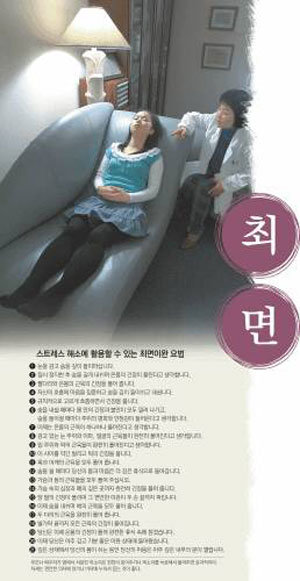Not a Magic Show, Its Clinical Hypnosis
Not a Magic Show, Its Clinical Hypnosis
Posted March. 12, 2008 08:10,

A 17-year-old high school girl, identified by her family name Kim, was lying on a large recliner chair in a psychology and hypnosis clinic in Seoul. She suffers from too much anxiety and stress during exams, resulting in poor performances. As an effort to relieve test anxiety, she began to receive hypnotic treatment after being recommended from neuro-psychiatrist Chae In-yeong.
Kim stared at a spot on the wall. Then, she stretched her arms and closed her eyes after gazing at the space between her arms. The specialist said, This is a hypnosis induction period, a step prior to getting trance treatment. This method is required to help a participant to concentrate his or her mind so that they are fully induced.
When the induction process finished, the neuron-psychiatrist started hypnotic treatment by speaking in a low voice, saying, You will be relaxed when you take a test from now on. After the first session of treatment ended, the doctor woke her up as she counted to ten.
I used to feel nervous and uneasy, but now I feel more relaxed. I thought hypnosis was something similar to sleepwalking. However, I was awake during the treatment as I could hear her voices very clearly, said Kim after the hypnotic treatment.
○ Utilizing suggestion while patients are awake and focused
Many people are taking an interest in clinical hypnosis. In the past, only those with severe psychiatric problems underwent such treatment. However, these days, hypnosis is widely used for treating physical or psychological clinical problems, such as smoking and managing stress with office workers.
The hypnotic treatment was officially approved for use in medicine and surgery by the American Medical Association (AMA) in 1958 and was introduced in Korea in 1987. About 100 neuro-psychiatrists serve as members of The Korean Society of Clinical Hypnosis and employ hypnosis in treating psychological problems.
They point out that many ordinary citizens misunderstand clinical hypnosis. Part of the confusion about hypnosis also stems from many TV programs which show entertainers under the influence of hypnosis walking around or doing whatever they are told to do. It can be interpreted this way. One possibility is that they are really hypnotized or they are just acting, since they are meant to entertain viewers. Unfortunately, the latter is more likely.
Byeon Yeong-don, director of Pyun Neuropsychiatric Clinic in Seoul, said, Think of those times when you were engrossed in a movie in a theater and caught yourself unaware of what your partner said. Or when you were unaware that someone else called you because you were immersed in your studies.
The second most popular misconception about hypnosis is that the person often acts strangely, regardless of his or her will under hypnosis. This is not the case. In contrast, a person undergoing hypnosis is in state of awareness, consciousness or perception. The state under hypnosis is different from that of sleep given that hypnosis takes place when a patient is highly concentrated and awake. Clinical hypnosis is not sleep, although some people get so relaxed in a trance that they may fall asleep.
○ Effective on chronic diseases, pain control, and anxiety.
Before undergoing trance treatment, a participant is required to take a hypnosis susceptibility test to know if the person is going to be a good candidate for hypnosis.
If you are easily engrossed in a book or movie or easily fall in love, then you are likely to respond to hypnosis. Hypnosis is said to be linked to the amount of imagination in subjects. Research suggests that people easily hypnotized have high hypnosis susceptibility and that the youth are more easily hypnotized. Four in ten people do not respond to the treatment.
Dr. Byeon said, The results of the treatment depend on the methods a specialist takes and the confidence of patients in their psychiatrist. He added, If the candidate is highly hypnotizable and performs self-hypnosis, just one session of the treatment may be enough to finish it. Various people take hypnotic treatment for a variety of reasons. Psychological therapy is found to be effect to reduce pain of chronic diseases, cancer, or psychiatric disorder such as test anxiety, astraphobia, stage freight, and stress.
Hypnosis is also recommended for musicians who experience a high level of anticipation, excitement, and nerves before any performance. The treatment will help relieve their anxiety as they perform under psychological relaxation.
Usually, 10 to 12 treatment sessions are required, but some may be enough with only four sessions. It takes about one hour to receive the treatment.
Dr. Chae said, This therapy is useful for todays people living under too much stress. Through hypnosis, they can introspectively searching for their hopes and dreams, so that they are able to move on to the next step in the journey to make their dreams come true.
likeday@donga.com



![[속보]윤석열 사형 구형…내란특검 “전두환보다 엄정히 단죄해야”](https://dimg.donga.com/c/138/175/90/1/wps/NEWS/IMAGE/2026/01/13/133151283.1.jpg)



